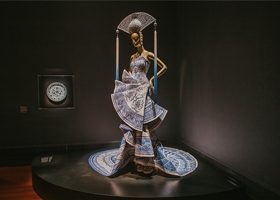
Intima Asia
China’s economy is maturing, leading domestic and international brands to become more and more concerned about this prominent age group. Millennials have been the subject of a number of surveys and studies, but thanks to a contribution from Ching Zhao Yao, trend expert, fashion designer and millennial, Intima Asia is putting them back in the spotlight in an unusual way.

Six Pairs of Eyes
In order to better understand Chinese Millennials, it’s important to observe them from different angles, in order to acquire a whole and objective picture of this very unique generation. It is particularly interesting to talk about “married Millennials” because they differ greatly when compared with their single counterparts and are, usually, quite contradictory. Married Millennials are, on the one hand, deeply influenced by their parents, while at the same time, want to be free from their influence; this affects their attitude towards life.
The majority of Chinese Millennials are only children. They are lucky but also under pressure. During childhood, they don’t only have their parents but also their grandparents. In other words, they are surrounded by six adults who love them and are prepared to do anything to make them happy.
Can you imagine having six eyes follow you throughout your childhood? Good behavior and obedience, both at home and at school, was key or else they risked hurting not just two parents but three sets of parents! As Millennials grew into adults, their parents also got older but remained very much invested in their child and grandchild.
Most Chinese Millennials had six parents. They are perhaps the greatest parents in the world. They provide all of their love,attention, patience, and money to their children without asking for anything in return. It is a big love but along with all of this love comes pressure. When these Millennials become adults who make decisions for themselves, they often struggle to break away from their parents’ influence. When they want to try something rebellious, they feel guilty, if they want to buy something expensive (such as a flat, a car or a luxury), they usually have to ask for financial support from their parents and when they finally become parents themselves, they also have to rely on their parents to care for the baby during the day.
From mentality to economy to time, Millennials struggle to be so they have to compromise with their parents at times and as a result are a contradictory generation. This reflects on their travel, shopping, entertainment and so on.
Designed by macrovector / Freepik
When the Baby Comes
As we all know, Millennials like to travel, but the situation becomes complicated if they get married and have children. They travel with their kids, and often their parents too, for leisure. Their parents take care of their grandchild for years and the older couple also needs to have a rest. Millennials would like to travel alone to enjoy a short and relaxing vacation but if they do they will hurt their parents. It is tiring to travel with a small child and they don’t even always want to do that either but on the other hand, they enjoy family time all together. Their lives themselves are contradictions.
The demand for services and hospitality that are efficient, comfortable, convenient and good value for money are tied to the generation’s preference for travelling with family. If travel and hospitality companies can understand the contradictory and unique life stage of Millennials and the resulting demands, it will find a loyal consumer base.

Undies Preferences
Compared with previous generation, Millennials are more fashionable. They would like to try different styles. For example, in the area of intimates, they are craving a different fit for their underwear, and lingerie standards are being challenged. Traditionally the construction and fit of Chinese intimates is padded, with extra push-up and lots of cleavage. Generation X and Boomers in China were focused on comfort, shape, materials and price. While Millennials are not only concerned about all of these, but also pay more attention to the style of design and design details. They will choose different style of intimates and swim to match their lifestyle. Aimer, Triumph, Embry Form, Maniform, Wacoal, Uniqlo, 6ixty 8ight, CK, Victoria’s Secret, C-IN2, Oysho, Mimi Holiday, La Perla, these brands are mostly popular in this generation. With retail platforms changing and brands looking to different methods to capture customers, Millennials can find information about brands very easily. They will compare price, design, materials, shape and color choices offered by different brands before they make a decision. Pretty underwire, fashion bodies, stick-on backless bra, versatile sleepwear, Athletic-inspired bralettes, graduated push-up styles and wireless bra, off-shoulder bikini top, frill bikini top, sweet style (swimsuits and intimates with romantic ruffles and frills, or beautiful lace decoration), retro style, casual and sporty, barely-there hipster, all these are very attractive to contemporary Millennials in China. It will influence the next two seasons as well.
You Said Sexy Lingerie?
I didn’t talk about sexy lingerie too much because it is a complicated topic for this generation. Most married Millennials love sexy lingerie, but compared to other style items, they have less sexy stuff in their wardrobe. If you want to know the reason, we ‘d better divide them into two groups.
The first group of Millennials are married and stay at home to take care of babies. In China, there are more stay-at-home moms than dads. These people usually pay more attention to their family and kids, so much so that they don’t have enough time to take care of themselves. Cleaning the house, cooking for a family, taking care of children, all these jobs take up all of their time and energy. Comfortable intimates are their favorite items. For an example, a super-light, comfortable pantie with a no-show effect and ultra-light lace with a stretch tulle and flat-finished seams will be a lovely choice for this group of Millennials.
Sometimes they, usually women, buy one or two items of sexy lingerie with their husband or wife in mind. For example, wives like frilled hipsters, which add a romantic touch to a simple style. A modern slip can be wonderful lingerie and styled as outerwear. Clean-cut silhouettes in dressy, versatile fabrics such as chiffon or washed silk can be used for under or outer layering. A soft thong looks nice but isn’t going to be a favorite for at least half of Chinese wives because it isn’t comfortable.
The other group of Millennials are married but are still working. They usually live with their parents if they already have children; otherwise no one is there in the day to care for their babies. In respect to Millennials themselves, their parents are very traditional. This stops them from buying very sexy underwear. Even if they think about buying it for a long time, they are worried that if they bought thongs, cut-out thongs, cut-out bras, or S&M intimates, that their parents would find it and be worried about them. They would feel embarrassed if their parents found sexy underwear.
With many styles and shapes on offer, having a pretty option is important, but their purchases are always made in the context of this social and cultural pressure. At the same time, there are still some super fashionable and brave Millennials who would like to try very sexy items. Married Millennials are a contraction when it comes to shopping.

Social shopping addicts
If you think that this pressure will stop Millennials from daring to go shopping then you would be wrong.
They would like their lives to be enjoyable and are willing to pay for it. They like shopping and usually run out of their monthly salary because there are so many interesting things they want to experience and buy. They would like to shop via their cell phones and they usually have several shopping apps. Driven by high cell phone ownership, increased mobile network connectivity, and a boom in mobile payments, m-commerce in China now makes up almost a fifth of the country’s e-commerce market and was nearly up to RMB 2.8 Trillion (US 450bn) by 2016. The shopping apps gaining traction are those with social networking functions, visually driven content, intuitive layout and utility functions such as price comparisons, aggregated reviews and in-app payment options.
For example, Meilishuo (‘Beauty Talk’) is an online marketplace backed by Tencent to sell cloths, footwear, accessories, and so on. Its mobile app generates more than 70% of its sales from a monthly average of 9.7m users. Meilishuo’s average user spends 30 minutes on the app every day.
Another example, Mogujie (‘Mushroom Street’) has 85 million registered users, 35 million monthly active users and average monthly sales of RMB 300m (US 48m).
These two companies used to be competitors; both in terms of functionality and user base, but in 2016 they merged into once company.
Meilishuo, Mogujie, Taobao, Tmall, Amazon, Jingdong, Ctrip, Yilong, Airbnb,Mykitchen, O2 and so on, these apps influence the young generation and attract them to shopping.
Feeling lonely
Then we can talk about Millennials’ loneliness. They used to feel lonely because most of them were the only child in their family. Happiness, sadness, angry, anxiety, during childhood, they had no one to share these emotions with. Therefore, they are keen to communicate with the outside. Like Generation Z, they also grew up with internet, it is like oxygen to them. They play with Tencent’s QQ and Wechat, where they can meet new people online.
While they may struggle talking face to face, through these platforms they are able to share their emotions and thoughts with strangers. A window opens in their lonely world. While foreigners may like to use Facebook, twitter and Instagram, Chinese people can’t typically use Facebook. If you have a mobile in China, and you know how to use the internet, then you must have the QQ and WeChat apps on your mobile. In the last five years, WeChat has become more popular than QQ. WeChat is a social networking platform that brings together people eager to make friends, communicate and also offers a convenient way to pay for items.
Many famous Chinese brands have an official WeChat account that is used to spread their news, seasonal collections, and communicate with their fans. It is a really smart idea. Millennials can live without TV, shopping malls, but not without internet. They can’t endure it for even one day. They use the internet on their mobile phones everyday and go through their WeChat frequently. Millennials often spend at least 2 hours on their mobile to read WeChat official accounts’ articles and to communicate with friends or customers. Tencent’s Penguin cool has released its latest ‘2017 WeChat users & Eco Research Report’. According to the report data, as of December 2016, WeChat had a total of 889 million active monthly users globally.
More and more brands put effort into managing their official WeChat account and try to get more fans involved in their brands. So, if you make a conclusion that the Millennials in China like the internet and WeChat, then you are wrong. They wouldn’t mind if one day WeChat disappeared from their life, because they believe another product will replace it sooner or later. They hate the internet sometimes but they can’t live without it. That is weird and contradictory but it is the truth.

A Little Guilty
The Millennials’ contradiction is also reflected in their attitude to their life. Most of their parents did not have very wealthy childhoods, so they typically tried to earn money and provide more for their children than they had. When Millenials grow up, they seek a high quality of life and would like to be rich. They work hard to earn more money and make their family life better than before. Brand and quality is important to them; they will compare different brands with their price and quality from different retailers’ online shops and reality shops. They have to be a smart consumer, because they need to afford a flat, car, baby, and so on. Paying for a flat is one of the most important things in their married life. Except some lucky and wealthy people, most Millennials need to buy a flat before or after they get married. It is a tradition in China in almost every province. There is not much money left afterwards for them to enjoy life. However, they will try their best to earn more money to buy what they want, to enjoy what they like, to love who they care about.
The married Millennials in China are a generation of contradictions; they have strayed furthest from traditional values such as filial piety. They know that they can’t change the world, but they try their best to find the balance among their family, job, and life. Maybe they are not as mature as their parents’ generation, but they are learning to grow up and become more and more independent. They deserve to be respected.
Copyright 2024. All rights reserved - Terms







